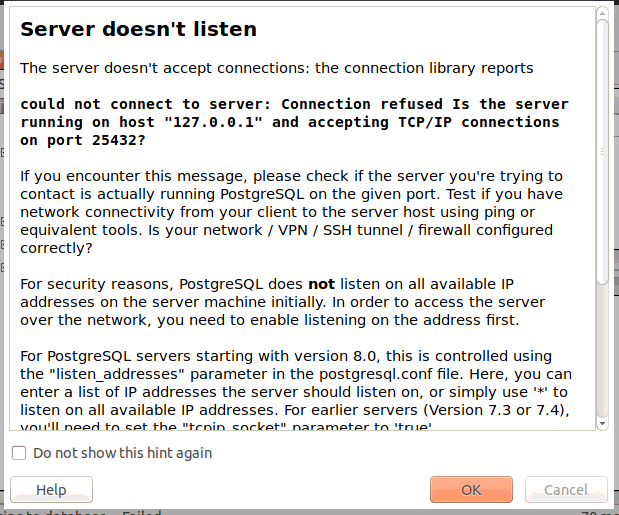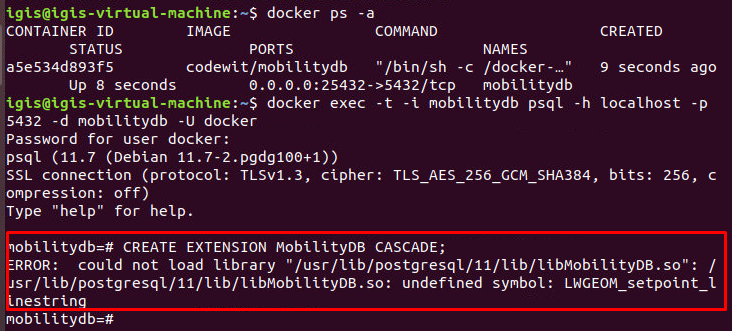An open source geospatial trajectory data management & analysis platform
MobilityDB is a database management system for moving object geospatial trajectories, such as GPS traces. It adds support for temporal and spatio-temporal objects to the PostgreSQL database and its spatial extension PostGIS.
MobilityDB is developed by the Computer & Decision Engineering Department of the Université libre de Bruxelles (ULB) under the direction of Prof. Esteban Zimányi. ULB is an OGC Associate Member and member of the OGC Moving Feature Standard Working Group (MF-SWG).
The MobilityDB project is managed by a steering committee.
More information about MobilityDB, including publications, presentations, etc., can be found in the MobilityDB website.
The pregenerated user and developer documentation can be found here.
To generate the documentation locally, refer to our documentation generation section
-
Compact geospatial trajectory data storage
-
Rich mobility analytics
-
Big data scale and performance
-
Easy to use full SQL interface
-
Compatible with the PostgreSQL ecosystem

-
Compliant with the Moving Features standards from the Open Geospatial Consortium (OGC)
-
Adopted by the Open Source Geospatial Foundation (OSGeo) as a community project
-
Database adapters to access MobilityDB from Python are provided by the PyMEOS package, supporting psycopg2, psycopg and asyncpg libraries.
-
Data generator and benchmark tool based on the BerlinMOD benchmark. The data generator takes input data from Open Street Map and uses pgRouting to generate routes between pairs of source and target locations.
-
MOVE plugin to display the result of MobilityDB queries in QGIS
-
An extensive workshop illustrating various usage scenarios of MobilityDB
These projects push the boundaries of MobilityDB and connect it with the PostgreSQL/PostGIS ecosystem.
- MobilityDB-AWS: MobilityDB on Amazon Web Services
- MobilityDB-Azure: MobilityDB on Azure
- MobilityDB-GCP: MobilityDB on Google Cloud Platform
- MobilityDB-Deck: Integration of MobilityDB with deck.gl
- MobilityDB-Leaflet: Integration of MobilityDB with Leaflet
- MobilityDB-OpenLayers: Integration of MobilityDB with OpenLayers
- MobilityDB-QGIS: Integration of MobilityDB with QGIS
- MobilityDB-PublicTransport: Integration of MobilityDB with public transport standards such as GTFS and Netex
- MobilityDB-OpenTripPlanner: Integration of MobilityDB with public transport standards such as OpenTripPlanner
There are two mailing lists for MobilityDB hosted on OSGeo mailing list server:
- User mailing list: https://lists.osgeo.org/mailman/listinfo/mobilitydb-users
- Developer mailing list: https://lists.osgeo.org/mailman/listinfo/mobilitydb-dev
For general questions and topics about how to use MobilityDB, please write to the user mailing list.
- The
masterbranch has the development of the next release. - The
stable-major.minorbranches have the patch releases of the correspongmajor.minorrelease.
The complete list of releases is available here
- Linux (other UNIX-like systems may work, but remain untested)
- CMake >= 3.7
- PostgreSQL >= 12
- PostGIS >= 3.0
- GEOS >= 3.8
- PROJ4 >= 6.1
- JSON-C
- GNU Scientific Library (GSL)
- Development files for PostgreSQL, PostGIS, GEOS, PROJ4, JSON-C, GSL
For example, you can build the following command to install all MobilityDB build dependencies for Debian-based systems using PostgreSQL 16 and PostGIS 3:
apt install build-essential cmake postgresql-server-dev-16 libgeos-dev libproj-dev libjson-c-dev libgsl-devHere is the gist:
git clone https://github.com/MobilityDB/MobilityDB
mkdir MobilityDB/build
cd MobilityDB/build
cmake ..
make
sudo make installYou should also set the following in postgresql.conf depending on the version of PostGIS you have installed (below we use PostGIS 3):
shared_preload_libraries = 'postgis-3'
max_locks_per_transaction = 128If you do not preload the PostGIS library you will not be able to load the MobilityDB library and will get an error message such as the following one
ERROR: could not load library "/usr/local/pgsql/lib/libMobilityDB-1.0.so": undefined symbol: ST_DistanceNotice that you can find the location of the postgresql.conf file as given next:
$ which postgres
/usr/local/pgsql/bin/postgres
$ ls /usr/local/pgsql/data/postgresql.conf
/usr/local/pgsql/data/postgresql.confAs can be seen, the PostgreSQL binaries are in the bin subdirectory while the postgresql.conf file is in the data subdirectory.
Once MobilityDB is installed, it needs to be enabled in each database you want to use it in. In the example below we use a database named mobility.
createdb mobility
psql mobility -c "CREATE EXTENSION PostGIS"
psql mobility -c "CREATE EXTENSION MobilityDB"Docker images with MobilityDB and all its dependencies are available here. These images are based on the official Postgres and Postgis docker images, please refer to them for more information.
If you have docker installed in your system you can run:
docker pull mobilitydb/mobilitydb
docker volume create mobilitydb_data
docker run --name mobilitydb -e POSTGRES_PASSWORD=mysecretpassword \
-p 25432:5432 -v mobilitydb_data:/var/lib/postgresql -d mobilitydb/mobilitydb
psql -h localhost -p 25432 -U postgresThe first command is to download the latest most up-to-date image of MobilityDB. The second command creates a volume container on the host, that we will use to persist the PostgreSQL database files outside of the MobilityDB container. The third command executes this binary image of PostgreSQL, PostGIS, and MobilityDB with the TCP port 5432 in the container mapped to port 25432 on the Docker host (user = postgres, db = postgres, pw=mysecretpassword). The fourth command is to connect to the database using psql.
Note that you can define the environment variable PGPASSWORD to avoid an interactive pw prompt.
PGPASSWORD=mysecretpassword psql -h localhost -p 25432 -U postgresPlease report any issues you may have.
Pregenerated versions of the user and developer documentation can be found here.
You can generate the user's manual in HTML, PDF, and EPUB formats. The manual is generated in English and in other available languages (currently only Spanish). For this, it is necessary to specify appropriate options in the cmake command as follows:
DOC_ALL: Generate in HTML, PDF, and EPUB formatsDOC_HTML: Generate in HTML formatDOC_PDF: Generate in PDF formatDOC_EPUB: Generate in EPUB formatLANG_ALL: Generate in all available languagesES: Generate the Spanish documentation
For example, the following command generates the documentation in all formats and in all languages.
cmake -D DOC_ALL=true -D LANG_ALL=true ..
make docAs another example, the following command generates the English documentation in PDF.
cmake -D DOC_PDF=true ..
make docThe resulting documentation will be generated in the doc directory of the build directory.
You can generate the English developer's documentation in HTML format. For this, it is necessary to the option DOC_DEV in the cmake command as follows:
cmake -D DOC_DEV=true ..
make doc_devThe resulting HTML documentation will be generated in the doxygen directory of the build directory.
- MobilityDB code is provided under the PostgreSQL License.
- MobilityDB documentation is provided under the Creative Commons Attribution-Share Alike 3.0 License 3.






